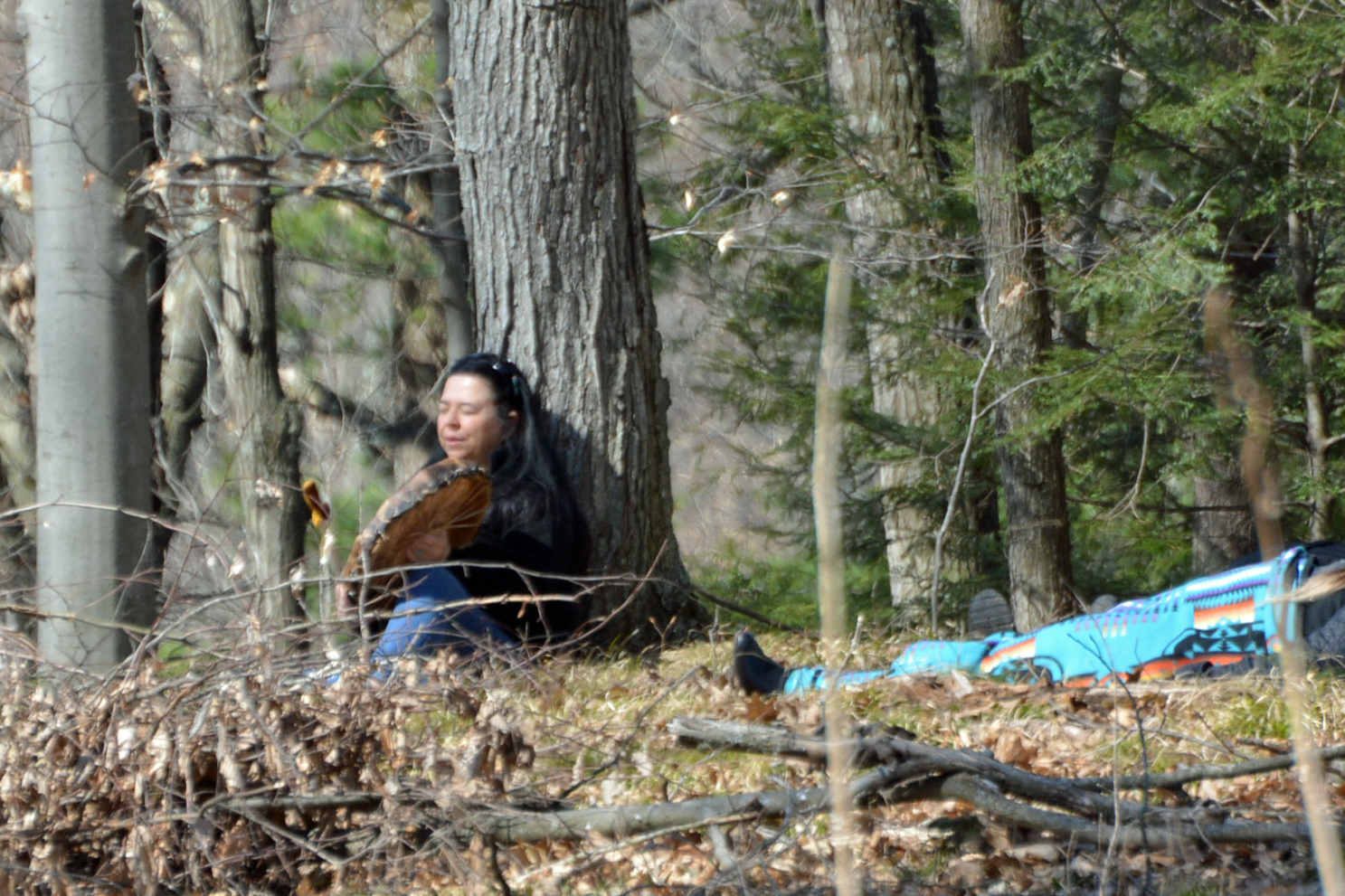Earth Day: Why sheltering in place shows need for nature
By David Horst, Environmental Grants Manager, Community Foundation
I have to admit that when the full extent of human suffering COVID-19 would bring became apparent, the work I’ve been doing at the Community Foundation on promoting development of more multi-use trails seemed about to become insignificant, or maybe “nonessential” in the current vocabulary.

A visitor to Hayman Falls County Park in Shawano County meditates by banging on a Native American drum.
The Community Foundation worked with Fox Cities Greenways and East Central Wisconsin Regional Planning Commission to host a Trails Summit on Feb. 25 at Bubolz Nature Preserve. We convened representatives of 15 towns, villages, cities and counties to give them a forum where they could work on and plan trail projects cooperatively. Prior to that, an inventory of area municipalities the Community Foundation conducted showed $19 million in trail projects are proposed just in the Fox Cities and just in the next three years. A report on the summit is available on our website.
An unexpected thing happened with COVID-19’s takeover of our lives. Sure, the food pantries needed to gear up, homeless shelters were pushed to their limits and unemployment soared. But people also turned to parks and trails.

Today, on this 50th anniversary of the first Earth Day, it is a good time to consider what’s happening here. What we have been saying all these months, people intrinsically knew. When they couldn’t stand being cooped up in the house another day, when they needed something different to do and fresh surroundings – a way to calm their minds – natural areas filled the bill.
High Cliff State Park reported 16,000 visitors the weekend of April 3-4. That’s a month’s worth of park users in two days. Unfortunately, with the numbers came more littering and vandalism, forcing the Department of Natural Resources to close the park.
Activity has stepped up at nature centers, even though their programs are canceled and buildings not open. The trails remain open and people are walking. They are pulling their bicycles out of winter storage. Others have hooked up the boat and gone fishing.
Debra Nowak, naturalist at Kaukauna’s 1,000 Islands Nature Center, said she is seeing a definite increase in trail use.
“Many people are seeking opportunities to get outside, which is what we have been preaching for so long!” Nowak said. Some people forgot trail etiquette at first, she said, but more signage and messages on social media seemed to address the problem.
Traci Koenig, executive director at Heckrodt Wetland Reserve in Menasha, described the increase in trail use as “massive.” Greater use has brought disregard for the rules, including people walking dogs or smoking on the trails, wandering off the trails or not observing the 6 feet of social distancing.
At Bubolz Nature Preserve in Grand Chute, Executive Director Randy Tuma reported increased trail use, particularly by new users, but “with that has come a sharp increase in littering, vandalism and disregard for the rules.”
Mosquito Hill Nature Center near New London has seen more litter with increased use of its trails, but Naturalist Mike Hibbard said volunteers quickly organized to clean it up. Similar reports of higher use came from Brillion Nature Center and Navarino Nature Center east of Clintonville.
It appears that after 50 years of celebrating Earth Day, we have come to the conclusion that nature is essential.
It was April 22, 1970, when Wisconsin’s U.S. Senator and former Governor Gaylord Nelson convinced the world’s population to celebrate the planet. Those of us who were around on that day remember it was a time when people commonly threw paper wrappers out their car windows and factories were fine with pumping their waste into a river to become someone else’s problem downstream.
But it was a time of awakening. Prior to the first Earth Day, Ladybird Johnson, wife of President Lyndon Johnson, led a national anti-litter campaign. Congress agreed on the Clean Air Act in 1970 and followed with the Clean Water Act a couple years later.
This resurgence doesn’t need a First Lady or an act of Congress. It only requires you to lace up your hiking boots or hop on your bicycle to calm your mind.
There is indeed a need for nature. But remember to be kind to your mother.



Leave a Comment